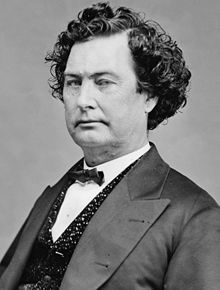Richard Yates | |
|---|---|
 Yates c. 1860–75 | |
| United States Senator from Illinois | |
| In office March 4, 1865 – March 3, 1871 | |
| Preceded by | William A. Richardson |
| Succeeded by | John A. Logan |
| 13th Governor of Illinois | |
| In office January 14, 1861 – January 16, 1865 | |
| Lieutenant | Francis Hoffmann |
| Preceded by | John Wood |
| Succeeded by | Richard J. Oglesby |
| Member of the U.S. House of Representatives from Illinois | |
| In office March 4, 1851 – March 3, 1855 | |
| Preceded by | Thomas L. Harris |
| Succeeded by | Thomas L. Harris |
| Constituency | 7th district (1851–53) 6th district (1853–55) |
| Member of the Illinois House of Representatives | |
| In office 1842–1845 1848–1849 | |
| Personal details | |
| Born | January 18, 1815 Warsaw, Kentucky |
| Died | November 27, 1873 (aged 58) St. Louis, Missouri |
| Political party | Whig (until 1854) Republican (after 1854) |
| Alma mater | Illinois College Transylvania University |
| Profession | Politician |
| Signature | |
Richard Yates (January 18, 1815 – November 27, 1873) was an American attorney and politician who served as the 13th Governor of Illinois from 1861 to 1865 during the American Civil War. He also represented the state in the United States House of Representatives from 1851 to 1855 and the United States Senate from 1865 to 1871.
Yates is considered[by whom?] one of the most effective war governors and was nicknamed the "Soldiers' Friend". He took energetic measures to secure Cairo, Illinois and St. Louis, Missouri against rebel attack. He helped organize the Illinois contingent of Union soldiers and commissioned Ulysses S. Grant, among others, as a colonel for an Illinois regiment.[1] He supported the Emancipation Proclamation.[2][3] As a Senator, he supported the impeachment and removal of President Andrew Johnson from office.[4]
- ^ Bohn (2011), pp. 18, 21.
- ^ Bohn (2011), pp. 28–29.
- ^ Hicken (1991).
- ^ Reavis (1881), p. 29.